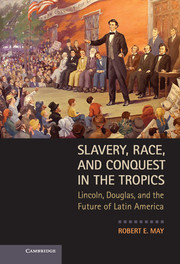Book contents
1 - A “Spot” for Manifest Destiny
Published online by Cambridge University Press: 05 June 2014
Summary
Ambitious congressmen needed little prodding to join the army when war erupted with Mexico in the spring of 1846. Since the earliest days of the Republic, Americans had promoted war heroes to their highest office. Generals George Washington, Andrew Jackson, and William Henry Harrison all won election as the nation’s chief executive primarily because of their military luster, and many other presidential contenders positioned themselves for presidential bids with martial exploits. No wonder, then, that a mere three days after Congress voted for war with Mexico on May 13 an observer in Washington reported some fifty congressmen had applied to the U.S. president, James K. Polk, for army commissions, in some instances on behalf of relatives, but many of them for themselves.
Caught up in this rage militaire, Stephen A. Douglas joined the ranks of U.S. congressmen clamoring for a commission. Just before the war, Douglas had established a military record by participating in a volunteer militia campaign to pacify Hancock County (in west central Illinois), where disorder had erupted between Mormons and their neighbors. Douglas served there as aide-de-camp at the rank of major to his recent fellow Illinois congressman, the militia general John J. Hardin. When warfare erupted with Mexico, Douglas considered military service again, perhaps partly from a sense of personal responsibility. As chairman of the House of Representatives’ Committee on Territories he had helped enact legislation annexing the independent Republic of Texas to the Union, a cause of the fighting since Mexico had never recognized the Lone Star Republic’s independence and still claimed it. Already known as a strident expansionist, Douglas emerged as the war progressed as one of the country’s most fervent apostles of Manifest Destiny – the new creed that God intended the United States, because of its superior democratic institutions, to possess the entire North American continent. Rather than campaigning with the army, however, Douglas remained in Congress, an arrangement that worked out to his political advantage.
- Type
- Chapter
- Information
- Slavery, Race, and Conquest in the TropicsLincoln, Douglas, and the Future of Latin America, pp. 5 - 56Publisher: Cambridge University PressPrint publication year: 2013



